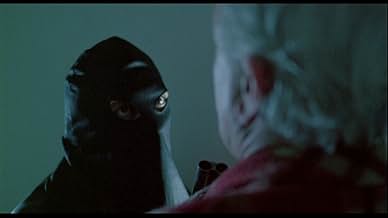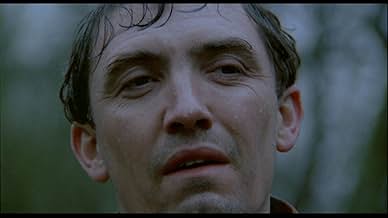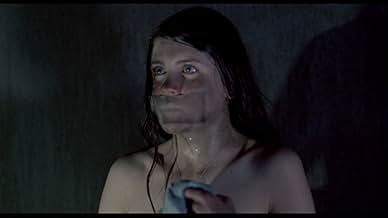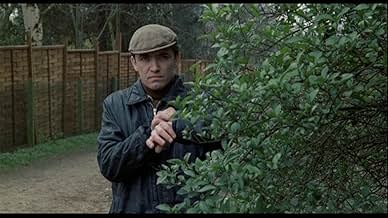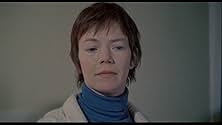Un ex-militaire belliciste mène une vie secrète de crimes qui culmine avec l'enlèvement d'une héritière adolescente.Un ex-militaire belliciste mène une vie secrète de crimes qui culmine avec l'enlèvement d'une héritière adolescente.Un ex-militaire belliciste mène une vie secrète de crimes qui culmine avec l'enlèvement d'une héritière adolescente.
- Réalisation
- Scénario
- Casting principal
Avis à la une
Living in the surrounding area of where the crimes took place I was pleased to find that the film followed the truth of what actually happened very closely.I enjoyed the film immensely,I thought it was well acted and well shot.
Donald Sumpter is flawless in his portrayal of Donald Neilson, a pretty weird guy. I saw this on tape when I was about five or six, and fifteen years later I still remember certain scenes very vividly. By all accounts one of the most factual true crime pictures ever made.
Although I have tagged this as 'liked', I don't think that's quite the word. Impressive, believable and very grim this is a virtual reenactment of real events that I remember well and took place only a couple of years before the film was made. A little bit of stylish photography, a bit of humour, just something to relieve the dull horror and it would have been possible to enjoy the film more.
What we have, though, is a unique cinematic impression of a real series of violent attacks and kidnap. The original newspaper reporting at the time presented a most unpleasant picture and here it is honestly and accurately represented on film. Everybody does well but the male lead is exceptional and the poor young girl victim almost too believable. You won't like it but as an example of gritty 70s UK cinema it is a great example.
What we have, though, is a unique cinematic impression of a real series of violent attacks and kidnap. The original newspaper reporting at the time presented a most unpleasant picture and here it is honestly and accurately represented on film. Everybody does well but the male lead is exceptional and the poor young girl victim almost too believable. You won't like it but as an example of gritty 70s UK cinema it is a great example.
I enjoyed this dramatisation of a true crime committed in the early 70's, but feel guilty for doing so. I remember the enormous headlines that this series of armed robberies, murders and the kidnapping of a teenage girl received at the time and how shocking they were. Donald Sumpter gives a convincing portrayal as the unpredictable Donald Nielson the ex soldier who rules his home as if he his still in the army. His wife and daughter are clearly afraid of him, although they have no inkling of his evil activities, with his long spells away from home accounted for by carpentry contracts. This drama centres almost entirely on the perpetrator and his activities including the extensive planning he does before he carries out his crimes. So, we get little insight into the long running police investigation where many people were dead before Nielson was finally caught. Maybe that could be another film, or perhaps it has been done already.
The Black Panther is directed by Ian Merrick and written by Michael Armstrong. It stars Donald Sumpter, Debbie Farrington, Marjorie Yates, Sylvia O'Donnell, Andrew Burt, Alison Key, Ruth Dunning and David Swift. Music is by David Hewson and cinematography by Joe Mangine.
Between 1971 and 1975 an armed robber turned murderer known as The Black Panther was hunted by police as the public in the North and Midlands areas of England waited anxiously. When 17 year old Leslie Whittle became a heiress to a fortune, she was kidnapped and held to ransom by The Black Panther. It was to end in tragedy. This is the story of Donald Neilson, ex-soldier of Her Majesty's Forces, also known as The Black Panther.
The Neilson trial ended in 1976. This movie went in to production shortly afterwards, which for many would surely be too soon? Sure enough when the press and media got wind of it a storm broke, a savage campaign ensued, headlines such as "sick exploitation" were used, BBC's Sue Lawley chastised it as sick rubbish even though she hadn't seen the film, in fact at this point nobody had seen the film! It was all guess work. The film was pulled from imminent distribution in the hope that the furore would die down. A few months later it had a limited release and went down well with critics who appraised it as not being exploitive but intelligent, tactful and meticulous in its reconstructions. But the press wasn't having it, and storm two broke and councils began to ban the film in their cities, eventually the picture was withdrawn and apart from a limited, but successful, VHS release in the early 80s, the film was out of circulation and buried. That is until now, where the BFI have put together a release of The Black Panther to DVD and Blu-ray that finally lets Merrick and Armstrong's brilliant movie get the exposure it deserves.
There is no getting away from it, the subject matter is troubling and will always be skirting the boundaries of bad taste. Often bigger budgeted films than this have shamefully milked real life horror in search of the big dollar. The Black Panther is not one such case, it's a sharp picture that asks some searching questions whilst not being afraid to implicate police inadequacies and press interference into the Whittle killing. There is no sensationalising of Neilson here, in fact he is portrayed as a bumbling fool once he begins to enact his crimes. His planning is meticulous, his army training giving him mental fortitude, but as we see, and remember this is all taken from real accounts and testimonies et al, he was a hapless fool in over his head. His home life shows him as a bully who can't let his regimental bent go, his poor wife and daughter meekly giving in to his tyrannical ways, but they had no idea they were living with The Black Panther. I mean would you know if you lived with a monster who fantasised about being a master criminal? Someone capable of murder? Would you?
With the lawyers of the day having gone through the screenplay with a fine tooth comb, you can rest assured that what you see is facts. The only points of the movie left to supposition are those played out with just Neilson and young Leslie, we only have Neilson's word on these events but again nothing is glorified and Merrick uses admirable restraint to really drive the sadness home. The film also plays out to a grim mid 70s British backdrop, the futility of Neilson's crimes dovetailing with the glumness bathing a United Kingdom of strikes, unemployment, racism and Northern Irish troubles. As a snap shot of the times it also has high interest value. Dialogue is sparse, often forcing us the viewers to be uneasily in the company of Neilson, watching him work and plot, smiling to his reflection in the mirror, to observe rare moments when he lets his emotional guard down. The makers ask us to ask the pertinent questions, just what made Donald Neilson what he was? Who was he? And should culpability be shared?
Backed by an astonishing and riveting performance by Sumpter, The Black Panther rounds out as an utterly gripping account of a terrible crime spree and the man who perpetrated those crimes. Too long this film has been forgotten, that in itself is as big a crime as that committed by the hypocritical press who fought to keep it from our eyes back in the dead part of the 70s. 10/10
Between 1971 and 1975 an armed robber turned murderer known as The Black Panther was hunted by police as the public in the North and Midlands areas of England waited anxiously. When 17 year old Leslie Whittle became a heiress to a fortune, she was kidnapped and held to ransom by The Black Panther. It was to end in tragedy. This is the story of Donald Neilson, ex-soldier of Her Majesty's Forces, also known as The Black Panther.
The Neilson trial ended in 1976. This movie went in to production shortly afterwards, which for many would surely be too soon? Sure enough when the press and media got wind of it a storm broke, a savage campaign ensued, headlines such as "sick exploitation" were used, BBC's Sue Lawley chastised it as sick rubbish even though she hadn't seen the film, in fact at this point nobody had seen the film! It was all guess work. The film was pulled from imminent distribution in the hope that the furore would die down. A few months later it had a limited release and went down well with critics who appraised it as not being exploitive but intelligent, tactful and meticulous in its reconstructions. But the press wasn't having it, and storm two broke and councils began to ban the film in their cities, eventually the picture was withdrawn and apart from a limited, but successful, VHS release in the early 80s, the film was out of circulation and buried. That is until now, where the BFI have put together a release of The Black Panther to DVD and Blu-ray that finally lets Merrick and Armstrong's brilliant movie get the exposure it deserves.
There is no getting away from it, the subject matter is troubling and will always be skirting the boundaries of bad taste. Often bigger budgeted films than this have shamefully milked real life horror in search of the big dollar. The Black Panther is not one such case, it's a sharp picture that asks some searching questions whilst not being afraid to implicate police inadequacies and press interference into the Whittle killing. There is no sensationalising of Neilson here, in fact he is portrayed as a bumbling fool once he begins to enact his crimes. His planning is meticulous, his army training giving him mental fortitude, but as we see, and remember this is all taken from real accounts and testimonies et al, he was a hapless fool in over his head. His home life shows him as a bully who can't let his regimental bent go, his poor wife and daughter meekly giving in to his tyrannical ways, but they had no idea they were living with The Black Panther. I mean would you know if you lived with a monster who fantasised about being a master criminal? Someone capable of murder? Would you?
With the lawyers of the day having gone through the screenplay with a fine tooth comb, you can rest assured that what you see is facts. The only points of the movie left to supposition are those played out with just Neilson and young Leslie, we only have Neilson's word on these events but again nothing is glorified and Merrick uses admirable restraint to really drive the sadness home. The film also plays out to a grim mid 70s British backdrop, the futility of Neilson's crimes dovetailing with the glumness bathing a United Kingdom of strikes, unemployment, racism and Northern Irish troubles. As a snap shot of the times it also has high interest value. Dialogue is sparse, often forcing us the viewers to be uneasily in the company of Neilson, watching him work and plot, smiling to his reflection in the mirror, to observe rare moments when he lets his emotional guard down. The makers ask us to ask the pertinent questions, just what made Donald Neilson what he was? Who was he? And should culpability be shared?
Backed by an astonishing and riveting performance by Sumpter, The Black Panther rounds out as an utterly gripping account of a terrible crime spree and the man who perpetrated those crimes. Too long this film has been forgotten, that in itself is as big a crime as that committed by the hypocritical press who fought to keep it from our eyes back in the dead part of the 70s. 10/10
Le saviez-vous
- GaffesWhen Neilson walks into the Kidderminster shopping centre in 1974, the M.E.B. showroom is advertising 'Jubilee Offers' for the Silver Jubilee year of 1977, when the film was made.
- ConnexionsFeatures Intimate Reflections (1975)
Meilleurs choix
Connectez-vous pour évaluer et suivre la liste de favoris afin de recevoir des recommandations personnalisées
- How long is The Black Panther?Alimenté par Alexa
Détails
- Durée
- 1h 37min(97 min)
- Mixage
- Rapport de forme
- 1.85 : 1
Contribuer à cette page
Suggérer une modification ou ajouter du contenu manquant


